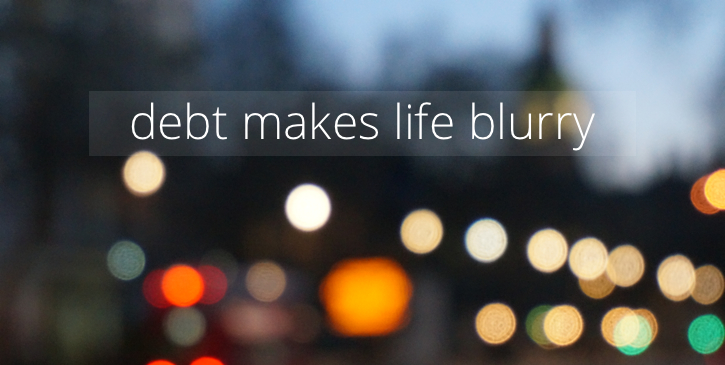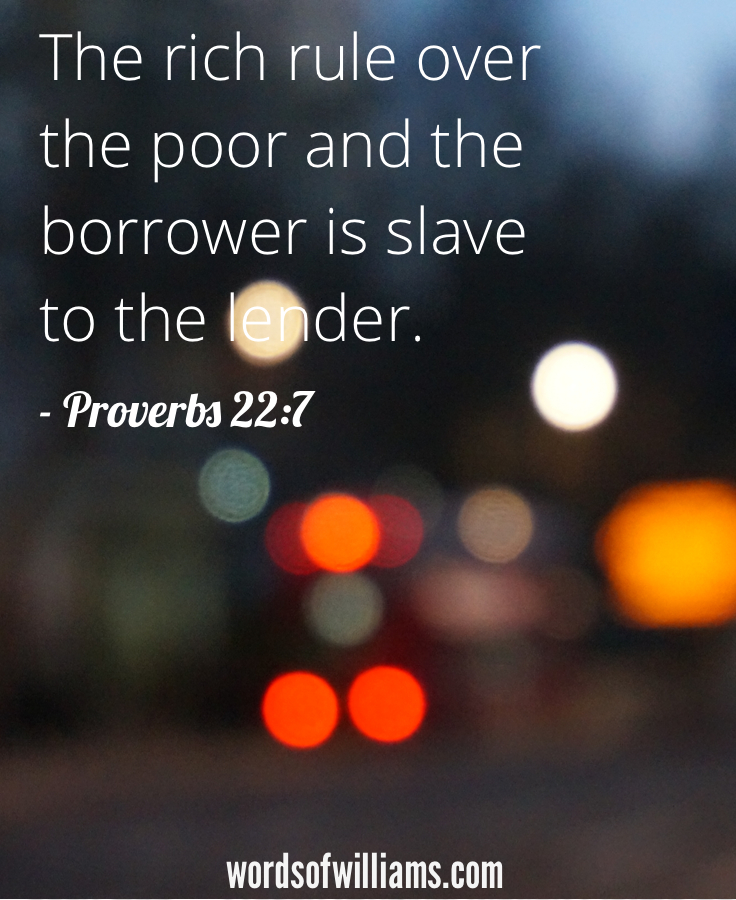What's Wrong With Debt?
Is debt really that bad? Why is debt bad? What’s the point of paying off debt? All valid questions that need to be answered before getting serious about moving forward toward other important financial goals. Important financial goals is a relative term for which you’ll have to look inside yourself to find the answer. But I’ll provide a few scenarios for context. Perhaps you’re wanting to make it through one of these scenarios…
- Have children and either mom or dad wants to stay at home with the kids.
- Transition jobs, but are afraid of backsliding financially.
- Dream of starting your own business, but the financial startup is too much to think about.
- Want to give to worthy causes, but always feel insecure that the money you are giving will be needed to keep the lights on next month.
Definition of Debt: something that is owed or that one is bound to pay to or perform for another. Take a deep breath and read that definition again. Something that is owed or that one is bound to pay to or perform for another. That’s not fun in anyway. The only fun is the moment in which our desires are satisfied by the “thing” that we’re willing to go into debt for.

Another way to put it: The rich rule over the poor and the borrower is slave to the lender. - Proverbs 22:7
Choosing Debt Or Not
When faced with a decision to go into debt for something, here are a few questions you can ask yourself before making the decision.
- Is this thing worth going into debt for?
- How much Interest will I be paying on this debt before it’s paid off?
- How long would I have to wait to pay for this in cash?
- Is this an emotional purchase? (A real need, or perceived based on the emotional state you are in)
There is a sickening amount of interest that is paid on consumer debt when carrying a balance. And without even realizing it, a feeling of insecurity and hopelessness has set in. Ever since we decided to get out of debt and hopefully never take on any more, the thought of making monthly payments for stuff shakes me to my core.
I remember the feeling of owing the furniture store for our couch and love seat that we bought when we moved into our house. And again when we “had” to have a king-sized bed. Here we were, barely making our mortgage payment every month. It really made home ownership taste sour for a few years. The sad thing is that we didn't know any better. And we felt entitled to have those things right away in my mid-twenties.
I also know the feeling of paying those things off and freeing that money up every month to do other, more important things. There is great freedom and joy that comes from saving up for something and paying cash for it. Trading in our Jeep for a minivan and handing the car salesman $1,200 in cash was the best feeling $1,200 I’ve ever spent. We wanted it, we save up the cash, we negotiated a good deal, we own the minivan.
The reason it felt so good was that the Jeep was our first vehicle purchase together and we had to beg Kelsey’s Dad for a loan to get it. Oh, the burden that put on us!!! So, paying off my father-in-law and then being able to make the next vehicle purchase in cash felt amazing. We were learning important lessons in saving, and applying what we learned along the way.
Wandering Into Debt
There are a few different ways we wandered into debt. Sometimes it’s the reverse compound interest that we end up paying for all the little things we don’t need. $20 here, $150 there and pretty soon, we can’t pay off your credit card when the bill comes. Then the minimum payment looks nice on the statement and I’m sure the credit card company doesn’t call too much attention to the amount of interest we’ll be paying when it’s not paid in full. And then the car needs new tires. How are we going to pay for that? (This part is made up, we never paid interest on credit cards, be we were a few short months from being in that type of a situation...)
Life happens and compounds the interest conveniently for you and against you. The one thing that can help change the direction of this story is a plan.
Make a Plan
Paying attention to the details, and purposefully planning out how the hard earned money will be spent. And then executing the plan. Discipline and focus will help change the direction. Changing behaviors and thought patterns about spending will accelerate the plan toward achieving the financial goal.
What hurdles do you face when it comes to making a plan with your money?

